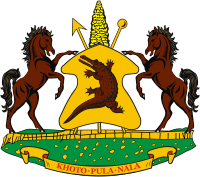 Space
Program of Lesotho
Space
Program of Lesotho
------The Lesotho Space Agency------
|
Level = 0 Development: Very Low
What has been going on in Lesotho?
What kind of space power do they have?
Does Lesotho have space weapons?
What are they planning over there? |
|
Population: 1,800,000 / Language: English / GDP: $3,300 / Cities: Maseru
Lesotho's Space Infrastructure Lesotho is one of the world's poorer countries, not only does it not have an agency, but also no infrastructure in which one would arise. The National University of Lesotho does not offer astrophysics, astronautics or aeronautics, and the government has no ministry devoted to science of this type. Lesotho has no history of being part of any organization dealing with space, nor has any launch capability. Lesotho lacks the industrial base, the educational base and the political foundation for a process like this to occur within it. Lesotho operates no satellites and, not having a presence, has no space power. The government of Lesotho in Masuru has no plans for attempting to further any ambition in space development or research. |
None
|
TODAY AND INTO THE FUTURE
Nothing Planned
|